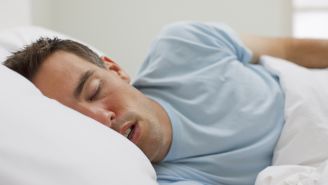Updated on March 13, 2024.
After one night of poor sleep, your focus and mood may be affected. You might feel groggy or irritable in the morning, but these symptoms usually clear up after a good night’s sleep.
But when sleep troubles become chronic (lasting over an extended period of time), they can contribute to a range of health issues, affecting your weight, immune system, mental health, and more.
Sleep issues are particularly common among both active duty Servicemembers and Veterans. For Veterans in particular, certain disorders like sleep apnea and insomnia are being diagnosed more than in decades past.
Sleep apnea is a condition during which your breathing is interrupted repeatedly while you sleep, leading to multiple short wakeups. Having insomnia means you have trouble falling asleep, staying asleep, or sleeping well on a regular basis.
More than 500,000 Veterans were diagnosed with sleep apnea in fiscal year 2022, according to the Veterans Benefits Administration Annual Benefits Report for that year. Meanwhile, roughly 57 percent of post-9/11 Veterans have insomnia, according to one 2020 study published in Sleep. That’s compared to about 30 percent of non-veterans who have insomnia.
Why Veterans have trouble sleeping
The roots of Veterans' sleep issues are numerous. Many Veterans are dealing with more than one issue. For example, they may be accustomed to a lack of sleep or irregular sleep patterns. These habits can develop during service and may become difficult to break while living as a civilian. Many Veterans are also managing medical conditions or physical impairments, from backaches to tinnitus (a persistent ringing sound in the ears with no external source). These can make it challenging to get good rest.
Other Veterans might be coping with mental health issues like depression, anxiety, and post-traumatic stress disorder (PTSD). For many Veterans, these can carry over from time serving or develop upon arriving home.
Post-traumatic stress, for example, frequently causes anxiety, triggers nightmares, and keeps you on alert throughout the night, making it tough to nod off or stay asleep. Physical conditions linked to PTSD, like chronic pain or traumatic brain injury (TBI), can keep you from sleeping, as well.
According to the 2020 study published in Sleep, 69.6 percent of veterans with chronic pain had insomnia and 77.7 percent with TBI did. Among those Veterans with PTSD, 93.3 percent had insomnia.
Treatments for sleep problems
Fortunately, you don't have to deal with sleep issues on your own. There are multiple treatments and strategies that can help you sleep better, including:
Therapy: There are various forms of talk therapy that can help improve sleep. Cognitive behavioral therapy for insomnia (CBT-I), for example, focuses on creating a sleep schedule, changing habits affecting sleep, and helping patients learn to quiet their minds. Some research shows it improves sleep in 7 out of 10 people who practice it.
Lifestyle changes: These may include adopting a healthy diet, getting regular physical activity, quitting smoking (if you smoke), and reducing intake of alcohol and caffeine.
Sleep hygiene: These are behaviors and practices that can make getting to sleep and staying asleep easier. Approaches include creating a dark, cool place for sleeping, using your bedroom only for sleeping, turning off electronic devices well before bedtime, creating a nighttime routine designed for relaxation, and having a consistent bedtime and wakeup time that you maintain through the week.
Medication: These may include benzodiazepines such as alprazolam, clonazepam, diazepam, or lorazepam. Nonbenzodiazepines may include zolpidem, eszopiclone, and zaleplon. You’ll need to speak with a healthcare provider (HCP) about these options to understand the risks and benefits of each medication and to determine which, if any, might be right for you.
Seeking help and finding relief
Sleep is so important to daily functioning that the U.S. Army has recognized sleep (along with physical activity and good nutrition) as part of its Performance Triad for achieving the best possible physical and mental health.
If you are struggling with sleep issues, reach out to an HCP. They can offer tips for improving sleep and screen you for underlying health conditions, such as sleep apnea, that may be interfering with your sleep. If you are experiencing issues such as PTSD, they can refer you to a counselor or therapist who can help.
The U.S. Department of Veterans Affairs (VA) also offers a free program called Path to Better Sleep that can help you better understand your sleep issues and work on improving your sleep.







